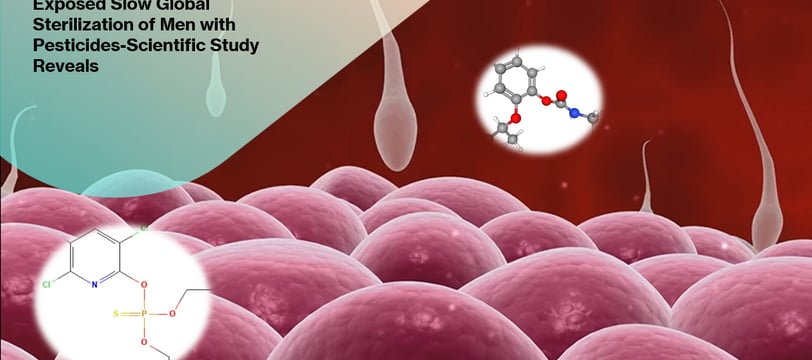Exposed Slow Global Sterilization of Men With Pesticides-Scientific Study Reveals
Exposed Slow Global Sterilization of Men With Pesticides-Scientific Study Reveals. In the intricate drama of scientific investigation, a revelation of global proportions has unfolded – a symphony of deadly organophosphate and n-Methyl carbamates pesticides.
Dr. Louis Bengyella
11/16/20232 min read


Exposed Slow Global Sterilization of Men With Pesticides-Scientific Study Reveals
https://youtu.be/QxA-fJqEaG4?si=EL5l-d5tLbYb4BsH
In the intricate drama of scientific investigation, a revelation of global proportions has unfolded – a symphony of 25 studies, 42 levels of impact, and the stories of 1774 men from diverse corners of our planet. The conclusion is stark and urgent: the presence of pesticides is wreaking havoc on male fertility, and it's time to take note and act wisely.
Imagine a generation, a loss-generation, defined not by their choices but by a silent adversary that rendered them sterile, unable to pass on the legacy of life. Their "crime"? Simply indulging in the everyday act of nourishing themselves with food laden with the remnants of lethal organophosphate and N-methyl carbamate pesticides. This seemingly innocuous choice has, tragically, sealed their fate when it comes to the natural course of procreation.
The saga unfolds in the Journal of Environmental Health Perspective, where Levine and his cohorts embark on a global analysis spanning the tumultuous era of the 20th and 21st centuries. Their findings paint a vivid picture of a tight correlation between the application of organophosphates and carbamates and a decline in sperm count among men.
Picture the lands from South-to-Central America, Asia, Africa, to Europe, where these pesticides have been liberally applied. Over 50 years, the ability of men to father children has plummeted by a staggering 50%. This means that a man who has traversed five decades is left with a mere 1-10% chance of producing viable offspring. The gravity of this revelation is both profound and alarming.
As these individuals grapple with the consequences of their ill-fate, a disconcerting celebration echoes from the halls of big tech. They applaud their success in producing organophosphates and N-methylcarbamates, branding them as "safe and effective" – a phrase dripping with irony given the undeniable evidence, as per Levine's findings, that these once-touted molecules have cast a dark shadow on men's reproductive health.
The clarion call for safe food now echoes with unprecedented urgency. While peeling techniques and washing agricultural products can offer some relief by removing surface residues of pesticides, the true path to safety lies in vigilance and a shift towards organic food sources.
In the face of a letdown by pesticides regulatory agencies, the time is ripe for the emergence of independent new food safety rating agencies.
This is where Safe Agric Consulting steps into the narrative, concluding this chronicle with a promise to safeguard the future of our sustenance.
